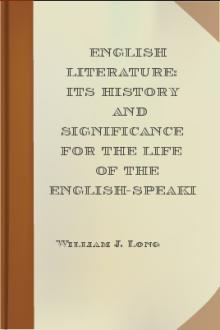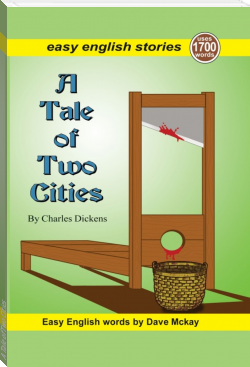English Literature: Its History and Significance for the Life of the English-Speaking World by William J. Long (good books for 8th graders txt) 📕

- Author: William J. Long
- Performer: -
Book online «English Literature: Its History and Significance for the Life of the English-Speaking World by William J. Long (good books for 8th graders txt) 📕». Author William J. Long
Of Butler himself we know little; he is one of the most obscure figures in our literature. During the days of Cromwell's Protectorate he was in the employ of Sir Samuel Luke, a crabbed and extreme type of Puritan nobleman, and here he collected his material and probably wrote the first part of his burlesque, which, of course, he did not dare to publish until after the Restoration.
HudibrasHudibras is plainly modeled upon the Don Quixote of Cervantes. It describes the adventures of a fanatical justice of the peace, Sir Hudibras, and of his squire, Ralpho, in their endeavor to put down all innocent pleasures. In Hudibras and Ralpho the two extreme types of the Puritan party, Presbyterians and Independents, are mercilessly ridiculed. When the poem first appeared in public, in 1663, after circulating secretly for years in manuscript, it became at once enormously popular. The king carried a copy in his pocket, and courtiers vied with each other in quoting its most scurrilous passages. A second and a third part, continuing the adventures of Hudibras, were published in 1664 and 1668. At best the work is a wretched doggerel, but it was clever enough and strikingly original; and since it expressed the Royalist spirit towards the Puritans, it speedily found its place in a literature which reflects every phase of human life. A few odd lines are given here to show the character of the work, and to introduce the reader to the best known burlesque in our language:
He was in logic a great critic,Profoundly skilled in analytic;
He could distinguish, and divide
A hair 'twixt south and southwest side;
On either which he would dispute,
Confute, change hands, and still confute;
He'd undertake to prove, by force
Of argument, a man's no horse;
He'd run in debt by disputation,
And pay with ratiocination.
For he was of that stubborn crew
Of errant saints, whom all men grant
To be the true Church Militant;
Such as do build their faith upon
The holy text of pike and gun;
Decide all controversies by
Infallible artillery;
And prove their doctrine orthodox
By apostolic blows and knocks;
Compound for sins they are inclined to,
By damning those they have no mind to.
Hobbes and Locke. Thomas Hobbes (1588-1679) is one of the writers that puzzle the historian with a doubt as to whether or not he should be included in the story of literature. The one book for which he is famous is called Leviathan, or the Matter, Form, and Power of a Commonwealth (1651). It is partly political, partly a philosophical book, combining two central ideas which challenge and startle the attention, namely, that self-interest is the only guiding power of humanity, and that blind submission to rulers is the only true basis of government.[179] In a word, Hobbes reduced human nature to its purely animal aspects, and then asserted confidently that there was nothing more to study. Certainly, therefore, as a reflection of the underlying spirit of Charles and his followers it has no equal in any purely literary work of the time.
John Locke (1632-1704) is famous as the author of a single great philosophical work, the Essay concerning Human Understanding (1690). This is a study of the nature of the human mind and of the origin of ideas, which, far more than the work of Bacon and Hobbes, is the basis upon which English philosophy has since been built. Aside from their subjects, both works are models of the new prose, direct, simple, convincing, for which Dryden and the Royal Society labored. They are known to every student of philosophy, but are seldom included in a work of literature.[180]
Evelyn and Pepys. These two men, John Evelyn (1620-1706) and Samuel Pepys (1633-1703), are famous as the writers of diaries, in which they jotted down the daily occurrences of their own lives, without any thought that the world would ever see or be interested in what they had written.
Evelyn was the author of Sylva, the first book on trees and forestry in English, and Terra, which is the first attempt at a scientific study of agriculture; but the world has lost sight of these two good books, while it cherishes his diary, which extends over the greater part of his life and gives us vivid pictures of society in his time, and especially of the frightful corruption of the royal court.
Pepys's DiaryPepys began life in a small way as a clerk in a government office, but soon rose by his diligence and industry to be Secretary of the Admiralty. Here he was brought into contact with every grade of society, from the king's ministers to the poor sailors of the fleet. Being inquisitive as a blue jay, he investigated the rumors and gossip of the court, as well as the small affairs of his neighbors, and wrote them all down in his diary with evident interest. But because he chattered most freely, and told his little book a great many secrets which it were not well for the world to know, he concealed everything in shorthand,--and here again he was like the blue jay, which carries off and hides every bright trinket it discovers. The Diary covers the years from 1660 to 1669, and gossips about everything, from his own position and duties at the office, his dress and kitchen and cook and children, to the great political intrigues of office and the scandals of high society. No other such minute-picture of the daily life of an age has been written. Yet for a century and a half it remained entirely unknown, and not until 1825 was Pepys's shorthand deciphered and published. Since then it has been widely read, and is still one of the most interesting examples of diary writing that we possess. Following are a few extracts,[181] covering only a few days in April, 1663, from which one may infer the minute and interesting character of the work that this clerk, politician, president of the Royal Society, and general busybody wrote to please himself:
April 1st. I went to the Temple to my Cozen Roger Pepys, to see and talk with him a little: who tells me that, with much ado, the Parliament do agree to throw down Popery; but he says it is with so much spite and passion, and an endeavor of bringing all Nonconformists into the same condition, that he is afeard matters will not go so well as he could wish.... To my office all the afternoon; Lord! how Sir J. Minnes, like a mad coxcomb, did swear and stamp, swearing that Commissioner Pett hath still the old heart against the King that ever he had, ... and all the damnable reproaches in the world, at which I was ashamed, but said little; but, upon the whole, I find him still a foole, led by the nose with stories told by Sir W. Batten, whether with or without reason. So, vexed in my mind to see things ordered so unlike gentlemen, or men of reason, I went home and to bed.
3d. To White Hall and to Chappell, which being most monstrous full, I could not go into my pew, but sat among the quire. Dr. Creeton, the Scotchman, preached a most admirable, good, learned, honest, and most severe sermon, yet comicall.... He railed bitterly ever and anon against John Calvin and his brood, the Presbyterians, and against the present terme, now in use, of "tender consciences." He ripped up Hugh Peters (calling him the execrable skellum), his preaching and stirring up the mayds of the city to bring in their bodkins and thimbles. Thence going out of White Hall, I met Captain Grove, who did give me a letter directed to myself from himself. I discerned money to be in it, and took it, knowing, as I found it to be, the proceed of the place I have got him, the taking up of vessels for Tangier. But I did not open it till I came home to my office, and there I broke it open, not looking into it till all the money was out, that I might say I saw no money in the paper, if ever I should be questioned about it. There was a piece of gold and 4£ in silver.
4th. To my office. Home to dinner, whither by and by comes Roger Pepys, etc. Very merry at, before, and after dinner, and the more for that my dinner was great, and most neatly dressed by our owne only mayde. We had a fricasee of rabbits and chickens, a leg of mutton boiled, three carps in a dish, a great dish of a side of lambe, a dish of roasted pigeons, a dish of four lobsters, three tarts, a lamprey pie (a most rare pie), a dish of anchovies, good wine of several sorts, and all things mighty noble and to my great content.
5th (Lord's day). Up and spent the morning, till the Barber came, in reading in my chamber part of Osborne's Advice to his Son, which I shall not never enough admire for sense and language, and being by and by trimmed, to Church, myself, wife, Ashwell, etc. Home and, while dinner was prepared, to my office to read over my vows with great affection and to very good purpose. Then to church again, where a simple bawling young Scot preached.
19th (Easter day). Up and this day put on my close-kneed coloured suit, which, with new stockings of the colour, with belt and new gilt-handled sword, is very handsome. To church alone, and after dinner to church again, where the young Scotchman preaching, I slept all the while. After supper, fell in discourse of dancing, and I find that Ashwell hath a very fine carriage, which makes my wife almost ashamed of herself to see herself so outdone, but to-morrow she begins to learn to dance for a month or two. So to prayers and to bed. Will being gone, with my leave, to his father's this day for a day or two, to take physique these holydays.
23d. St. George's day and Coronacion, the King and Court being at Windsor, at the installing of the King of Denmarke by proxy and the Duke of Monmouth.... Spent the evening with my father. At cards till late, and being at supper, my boy being sent for some mustard to a neat's tongue, the rogue staid half an houre in the streets, it seems at a bonfire, at which I was very angry, and resolve to beat him to-morrow.
24th. Up betimes, and with my salt eele went down into the parler and there got my boy and did beat him till I was fain to take breath two or three times, yet for all I am afeard it will make the boy never the better, he is grown so hardened in his tricks, which I am sorry for, he being capable of making a brave man, and is a boy that I and my wife love very well.
Summary of the Restoration Period. The chief thing to note in England during the Restoration is the tremendous social reaction from the restraints





Comments (0)